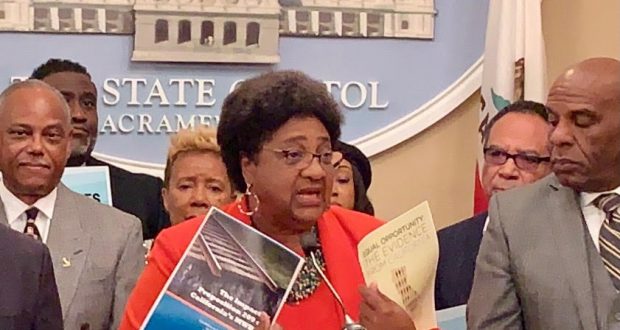By Joe W. Bowers Jr. | California Black Media
On November 3, voters will determine the fate of Proposition 16. If approved, it will repeal the ban on affirmative action written into the California Constitution after voters approved Proposition 209 in 1996.
The Constitution reads, “The state shall not discriminate against or grant preferential treatment to any individual or group on the basis of race, sex, color ethnicity, or national origin in the operation of public employment, public education, or public contracting.”
The campaign behind Prop 209 purposely omitted the phrase “ban affirmative action” in the ballot language because voter polls indicated that if it was used, support for the initiative dropped below 50%.
California is among just nine states outlawing affirmative action policies and programs in public education and government offices. Prop 209 halted all of the state’s affirmative action programs to increase representation of racial, gender and ethnic groups that have historically been discriminated against in access to public education, jobs, and business opportunities.
President John F. Kennedy by executive order first advocated for affirmative action to level the playing field and combat systemic racism denying opportunity for minorities competing for federal contracts. Whenever the constitutionality of affirmative action policies have been challenged, the U.S. Supreme Court has ruled that they are constitutional, except race and gender quotas are unconstitutional.
Prop 16 is on the ballot because a super majority of the Legislature passed Assembly Constitutional Amendment (ACA)-5. This initiative was introduced by Assemblymember Shirley N. Weber (D-San Diego) and co-sponsored by the Legislative Black Caucus.
Among the supporters of Prop 16 are the Legislative Women’s Caucus, the Legislative Jewish Caucus, the Legislative Asian & Pacific Islander Caucus, Gov. Newsom, Sen. Kamala Harris and many businesses, civil rights and faith-based organizations, and education and labor organizations, including Equal Justice Society, ACLU, Chinese for Affirmative Action and the California Teachers Association.
According to Weber, “While it was sold as a civil rights law when it passed in 1996, Prop 209 has cost women and minority-owned businesses $1.1 billion each year, perpetuated a wage gap wherein women make 80 cents on every dollar made by men, and allowed discriminatory hiring and contracting practices to continue unhindered. Far from being colorblind, the bill has set up barriers to women and minorities to share in the economic life of California. Proposition 209 has hindered public policy, thwarted opportunity and maintained economic disparity long enough. It’s time to give voters a chance to right this wrong.”
When legislators put the constitutional amendment on the November ballot, they were conscious of the protests over the killing of George Floyd in Minneapolis and the devastating impact that
the COVID -19 pandemic has had on people of color and consequently they embraced their responsibility to come to a reckoning with systemic racial inequities prevalent in the most diverse state in America.
Prop 16 will allow any state agency, city, county, public university system, community college district, or school district to establish policies and programs that can factor in someone’s race, sex and ethnicity in making decision on admissions, spending, and hiring. It will not permit the use of quotas.
While the public debate about repealing Prop 209 has fixated on the fairness of admissions policies at California colleges and universities and its detrimental impact on minority matriculation on the campuses, concerns about violating Prop 209 has for over two decades impeded policy makers from instituting programs in k-12 public schools specifically tailored to close the Black student academic achievement gap.
According to Dr. Elisha Arrillaga, Executive Director, The Education Trust West. “Repealing Prop 209 will enable our Local Control Funding Formula (LCFF) to address the needs of our most vulnerable students.”
Weber has twice proposed legislation, AB 2635 and AB 575, which would have directed LCFF funding to Black students who currently are the lowest performing racial ethnic subgroup on standardized assessments. Both times, concerns about violating Proposition 209 were raised and the bills failed.
In January, when Governor Newsom briefed Californians on his 2020-21 Education Budget, he said, “Where we are not seeing progress is for African Americans. It seems self evident that we should focus and concentrate our efforts in those areas in order to address … the substance of the vexing issue as it relates to academic achievement for our African American students.”
Newsom also mentioned the need to build a diverse teaching workforce with more teachers that look like their students. “That’s incredibly important as related particularly to African American achievement,” he said.
But, when the Department of Finance released the “omnibus education trailer bill” detailing Newsom’s education funding proposals there was no specific funding designated to help Black students close the achievement gap or any reference to sourcing more Black teachers. While not cited, avoiding conflict with Prop 209 was likely behind the trailer bill language omissions.
Passing Prop 16 will unblock the Governor, the Legislature and school districts with large African American student bodies from using LCFF supplemental funds on race conscious programs concentrating on closing the academic achievement gap being experienced by all Black students independent of their economic standing.
The ballot title for Prop 16 submitted by Attorney General Xavier Becerra says: Allows diversity as a factor in public employment, education and contracting decisions.
Polling for Prop 16 shows it not being well received by likely voters. The Public Policy Institute of California (PPIC) found 37% support. The Education Trust –West poll reports 66% of parents
of K-12 students supported it and a poll conducted by David Binder Research found 45% support for the initiative.
Eva Patterson, co-chair of the Opportunity for All – Yes on 16 Campaign, said, “Watching a focus group with Black voters from Los Angeles, they all said no we won’t vote for this as it was read to them. Then we explained that it was in favor of affirmative action and equal opportunity, and they all said, ‘Of course we’ll vote for this.”
Because the phrase “ban affirmative action” was cleverly not used in Prop 209, the challenge for the Yes on 16 Campaign is to clear up voter confusion about repealing a law that says you can’t discriminate at the same time it denies racial and gender equity.
If they succeed, school district policies targeting the specific needs of African American students will be legal to be implemented in California.
 Westside Story Newspaper – Online The News of The Empire – Sharing the Quest for Excellence
Westside Story Newspaper – Online The News of The Empire – Sharing the Quest for Excellence




